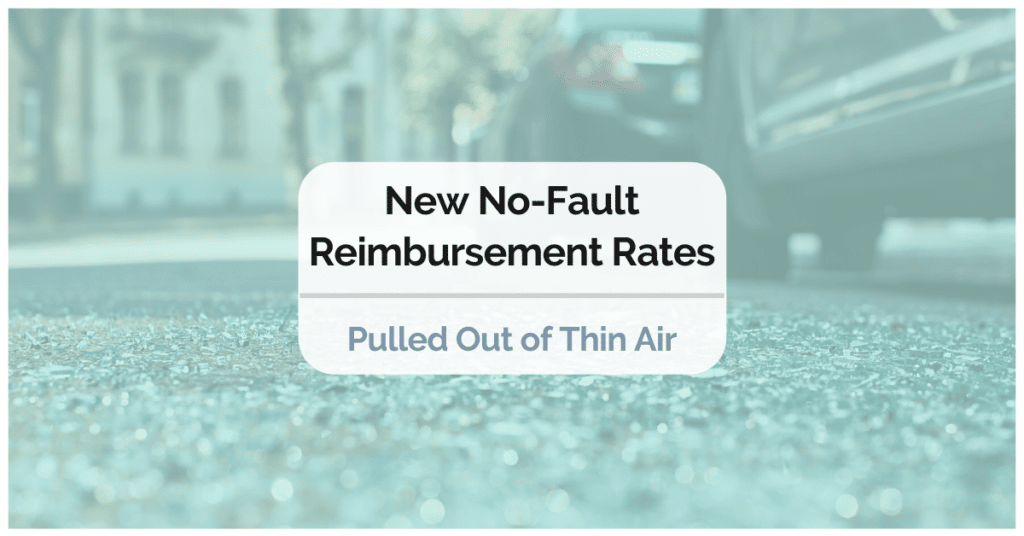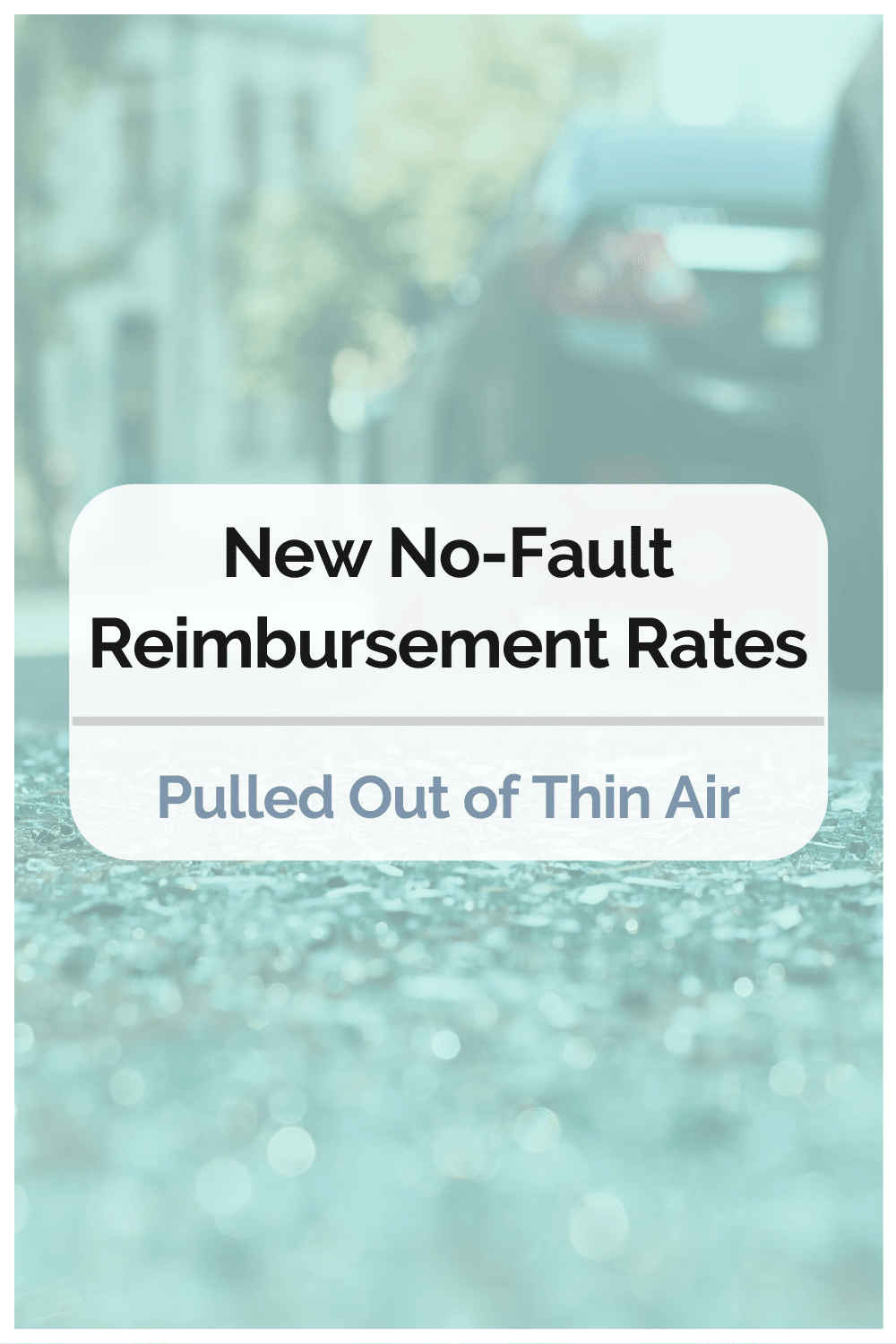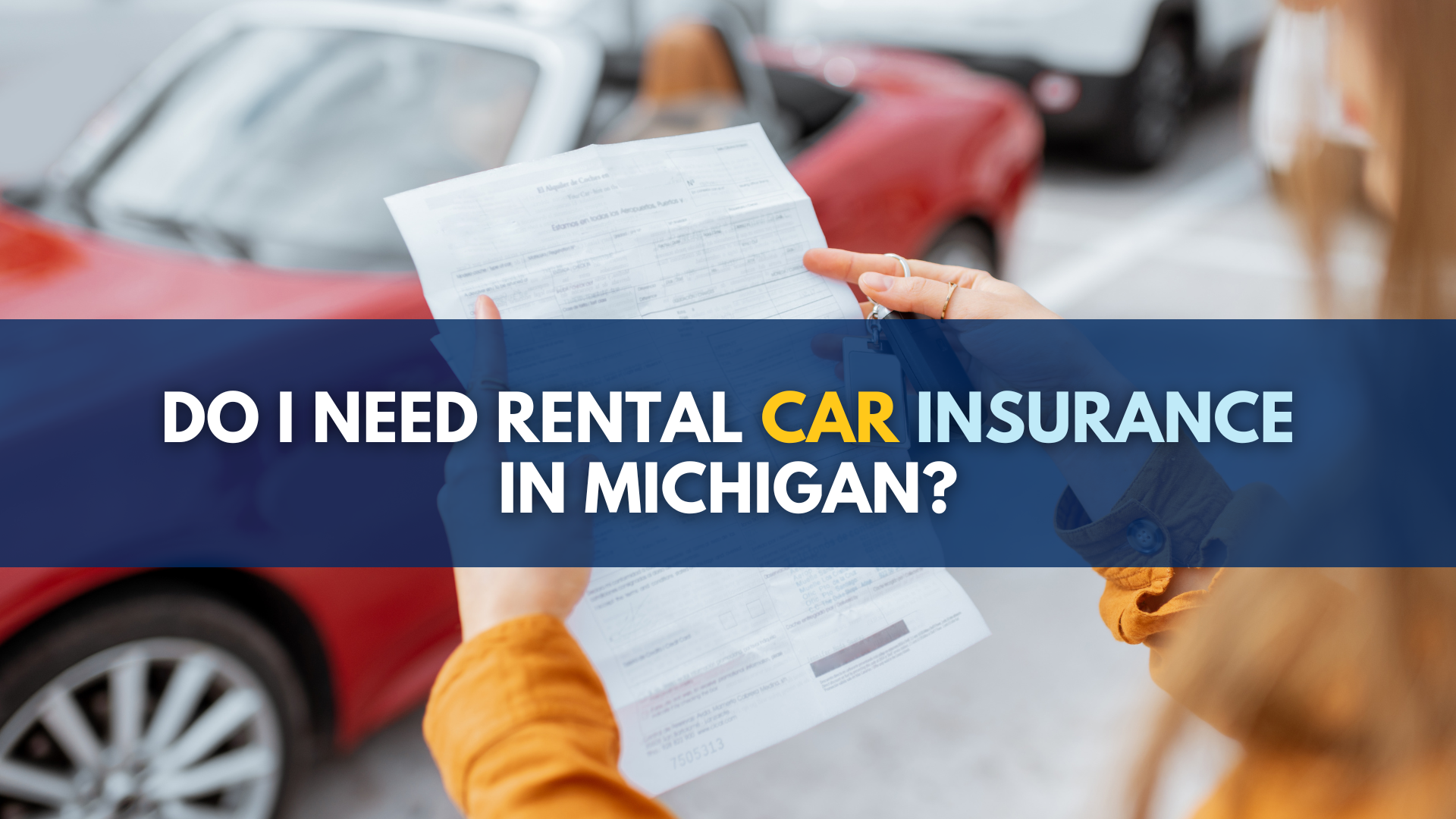
The new fee schedule includes permanent reductions in No-Fault reimbursement rates for medical providers who care for car accident victims and takes effect on July 1, 2021. The problem is these fee schedule reimbursement rates are completely arbitrary. Lawmakers literally pulled them out of thin air and we expect they will cause significant havoc and disruption.
The problem with these new and completely arbitrary No-Fault reimbursement rates is that it will cause Michigan car accident injury victims to be be deprived of access to essential medical care. The nature of the fee schedule means it will actually hit the most seriously injured car accident victims the hardest because it will be the rehabilitation facilities for spinal cord injury and TBI survivors and residential and home care facilities that will be most affected as these medical providers will be forced to slash their fees by 45% – even though the services and treatment for these catastrophic injuries will need to remain at the same level. Many of these medical rehabilitation facilities will be driven out of business or forced to make substantial cutbacks to quality of care, access to care, and staffing as this new arbitrary 45% reduction in cost slashes their ability to provide services nearly in half.
The 112-page bill proposing the plan for permanent reductions in No-Fault reimbursement rates that would ultimately be signed into law appeared out of thin air. It was introduced for the first time before the full House by Rep. Roger Hauck (R-Union Township) on Friday, May 24, 2019 – immediately after the House had rejected the plan that had been passed by the Senate and had been recommended for passage by the House Select Committee on Reducing Car Insurance Rates.
Without holding any public hearings or waiting for legislative analyses from the House and/or Senate Fiscal agencies, the full House passed Rep. Hauck’s new bill and sent it to the Senate – the same day.
In approximately 30 minutes time, late in the afternoon on Friday, May 24th, the Senate passed Rep. Hauck’s bill – despite the fact that the senators had never previously seen the 112-page bill and the fact that Rep. Hauck’s plan for reducing No-Fault reimbursement rates was vastly different from the one the Senate had approved two weeks earlier.
Six days later, on May 30, 2019, in a highly publicized, media-heavy ceremony at the Mackinac Policy Conference on Mackinac Island, Gov. Whitmer signed Rep. Hauck’s bill into law.
No wonder lobbyists for the insurance companies in Michigan were widely reported to be celebrating and having drinks that night! The boondoggle of all boondoggles was just jammed into the new auto No-Fault law legislation.
There’s only one way right now to fix this colossal mistake. Lawmakers need to take up and pass the legislative fix proposed in House Bill 4486 and Senate Bill 314.
As of this writing, there is no indication that this will happen.
UPDATE (6/30/2021): SENATE AND HOUSE APPROVE $25 MILLION FUND FOR CATASTROPHIC CARE PROVIDERS AFFECTED BY REDUCTIONS IN REIMBURSEMENT RATES
On June 30, 2021, the Michigan Senate and the Michigan House of Representatives approved an amendment to Senate Bill 28 that proposes to create a $25 million “post-acute auto injury provider relief fund” that would distribute funds to catastrophic care providers affected by the reimbursement rate reductions caused by the No-Fault medical fee schedule that is set to take effect on July 1, 2021. To receive a disbursement from the fund, a catastrophic care provider must show that: (1) its services are not covered by Medicare; and (2) the fee schedule is causing the provider to “bill at rates that are below the cost of providing the service.” Among other things, a provider seeking disbursement under the fund will be required to provide the Insurance Commissioner with “[d]ocumentation, including full financial statements, indicating a systemic deficit [or “systemic losses with respect to services offered to persons injured in motor vehicle accidents”] caused by the changes to charges” under the No-Fault medical fee schedule.
UPDATE (6/24/2021): NEW BILL INTRODUCED TO DELAY EFFECTIVE DATE OF REIMBURSEMENT RATES REDUCTION UNDER NO-FAULT MEDICAL FEE SCHEDULE
On June 24, 2021, House Bill 5125 was introduced which – if passed – would delay the effective date of the No-Fault medical fee schedule for spinal cord injury and traumatic brain injury rehabilitation facilities, residential care facilities, home health care agencies and attendant care services providers from July 1, 2021 to July 2, 2022. Additionally, the bill proposes to delay the effective of the new 56-hours-per-week limitation on No-Fault coverage for in-home, family-provided attendant care from July 1, 2021 to July 1, 2022. Please contact your state Representative, state Senator, the Speaker of the House of Representatives, the Majority Leader in the Senate and the Governor to urge them to act immediately to pass this important legislation.
UPDATE (6/10/2021): NEW BILL INTRODUCED TO FIX NO-FAULT FEE SCHEDULE REDUCTIONS ON REIMBURSEMENT RATES
On June 10, 2021, House Bill 4992 was introduced, which proposes to fix the No-Fault fee schedule’s limitations on reimbursement rates for spinal cord injury and TBI rehabilitation facilities, home health care agencies and attendant care providers whose care and treatment is not covered by Medicare. Under HB 4992, providers would not be “eligible for payment or reimbursement of more than”: (1) the “amount payable” under the provider’s “charge description master in effect on January 1, 2019”; or (2) the “average amount charged for the treatment or training in the relevant geographic region [“within 50 miles”] as determined by the 3 most recent market surveys conducted” by the Insurance Commissioner.
Limitations on No-Fault reimbursement rates
Under the No-Fault reform fee schedule that takes effect on July 1, 2021, the No-Fault reimbursement rates for the medical providers who treat and care for car accident injury victims – but whose services are not covered by Medicare – will be reduced to 55% of what they charged on January 1, 2019. (MCL 500.3157(7)(a))
After July 1, 2023, the percentage drops to 52.5% permanently.
Providers that fall into this category include rehabilitation facilities that treat spinal cord injury survivors and traumatic brain injury survivors, facilities that provide residential care, agencies that provide home health care and attendant care providers.
Medical providers whose treatment and training for car accident victims is covered by Medicare will be subject to reductions in their No-Fault reimbursement rates that are calculated as a percentage of the amount payable under Medicare. (MCL 500.3157(2), (3), (6) and (7))
After July 1, 2023, a lower, permanent percentage takes effect.
Why are we slashing No-Fault reimbursement rates by 45%?
I’ve been an attorney specializing in auto No-Fault law in Michigan for nearly 30 years, and I can emphatically state there was simply no reason to slash by 45% the No-Fault reimbursement rates for the most critical rehabilitation facilities that treat and care for our most seriously injured car accident victims.
It should be noted that during all the debate and deliberations over No-Fault reform in 2019, there was no evidence – no reports and no studies that were ever published or ever presented that showed that these vital medical providers who care for catastrophic brain injury and spinal cord injury accident victims were overcharging or price-gouging. Zero evidence. Not one bit of testimony, nothing. But as a result of this new law, No-Fault reimbursement rates for all medical providers who provided services not covered by Medicare will now have their fees cut nearly in half starting on July 1, 2021.
Yet, despite the glaring lack of evidence of wrongdoing, lawmakers arbitrarily and unwarrantedly passed a fee schedule that would reduce No-Fault reimbursement rates by 45% for medical providers with no history of overcharging or price-gouging and whose treatment, rehabilitation and services are vital to car accident victim’s ability to recover, heal and survive.
Slashing No-Fault reimbursement rates threatens vital access to medical care
Slashing No-Fault reimbursement rates will leave car accident victims with less buying power to pay for the medical care and treatment they need to heal and survive. Under the fee schedule, they will be unable to use No-Fault to buy the same care and treatment they did before – unless the provider is willing to accept reduced payment. If rehab costs $100 an hour and No-Fault only gives the victim $55 in coverage, then the victim no longer has the power to buy the rehab services that he or she did before. As such, either the victim has to buy less, or he or she has to chip in his or her own money to make up the difference, or the victim is forced to go without rehab because the provider will not – or cannot – provide services on a piecemeal basis.
This may also force medical providers to go out of business, leaving car accident victims literally with nowhere to turn, even if they can find the money to pay for their care.
The Michigan Brain Injury Provider Council has estimated that this slashing of No-Fault reimbursement rates under the new No-Fault fee schedule could deprive as many as 6,000 seriously injured car accidents of essential medical care and treatment.
In just the last week, print and TV news has reported that many providers are already making plans to close their doors or drastically restrict the services they offer by the end of June: (1) Hope Network TBI rehab facilities won’t be able to take patients at 55% of rates (Crain’s); (2) 1st Call Home Healthcare (provider of attendant care) closes 6/30 (Crain’s); (3) Health Partners Homecare (home health agency) closing (Crain’s); (4) Centria Home Rehab will cease catastrophic injury care by 6/30 (Letter); (5) Aspire Rehabilitation Services (which includes residential care) closes 6/30 (Fox 47); and (6) Origami Brain Injury Rehabilitation will limit services to “less serious catastrophic injuries” (Detroit News)
Rep. Hauck’s bill with permanent reductions appeared literally out of thin air
We may never know why permanent reductions in No-Fault reimbursement rates were arbitrarily and punitively imposed on the medical providers who care for and treat spinal cord injury and traumatic brain injury survivors and car accident victims requiring 24/7 attendant and medical care.
But we do know how it happened.
It happened because Rep. Roger Hauck (R-Union Township) pulled a new 112-page bill seemingly out of thin air right before the eyes of the full House of Representatives.
To understand how this occurred – and what happened afterward – it is important to start at the beginning:
- The law that we now know as No-Fault Reform 2019 started off as Senate Bill 1, which was introduced on January 15, 2019. It called for the creation of a No-Fault medical fee schedule to impose reductions on medical providers’ No-Fault reimbursement rates, but SB 1 provided no specifics.
- After as many as 8 hearings on No-Fault reform, the Senate Insurance and Banking Committee approved a substitute bill containing a Worker’s Comp-based fee schedule on May 7, 2019. That same day, the full Senate passed the 80-page S-1 substitute which said that medical providers who treat/rehab car accident victims are “not eligible for payment or reimbursement under this chapter of more than”: (1) the “amount payable for the treatment, training, product, service, or accommodation” under the Worker’s Comp fee schedule; or (2) for care or treatment not covered by Worker’s Comp “the average amount accepted by the person as payment or reimbursement in full for the treatment, training, product, service, or accommodation during the preceding calendar year in cases that do not involve” No-Fault auto insurance.
- The bill was sent to the House of Representatives where on May 16, 2019, the House Select Committee on Reducing Car Insurance Rates adopted and recommended that the full House pass an 85-page H-1 substitute which contained the same Worker’s Compensation-based fee schedule for reducing No-Fault reimbursement rates as was contained in the Senate’s S-1.
- On Friday, May 24, 2019, the full House rejected the H-1 version of the bill that had been approved and recommended by the House Select Committee on Reducing Car Insurance Rates.
- But the full House did take up and vote on Rep. Roger Hauck’s new 112-page bill on May 24th. Unlike the Worker’s Comp-based fee schedule in the bills passed by the Senate and approved by the House Committee, Rep. Hauck’s new bill proposed a Medicare-based fee schedule. It also proposed that No-Fault reimbursement rates be slashed by 45% – rather than averaged – for providers whose treatment and care is not covered by Medicare.
- As its last matter of business for the day on May 24th, the House passed Rep. Hauck’s bill and sent it to the Senate before adjourning at 4:10pm.
- At 4:44pm that same Friday, May 24th, the full Senate was called to order and took up Rep. Hauck’s bill that had been passed by the full House. After suspending the rule that the “bill be laid over one day,” the full Senate passed Rep. Hauck’s bill without amendment. The whole process took approximately 30 minutes. The Senate adjourned at 5:14pm.
- Six days later on May 30, 2019, at a lavish ceremony at the Mackinac Policy Conference on Mackinac Island, Gov. Whitmer signed into law Rep. Hauck’s bill and his Medicare-based fee schedule for the reduction of medical providers’ No-Fault reimbursement rates.
Incomplete information led to reduction of reimbursement rates under No-Fault fee schedule
The auto insurance industry made a vocal and loud case for No-Fault reform based on discrepancies in medical costs depending on whether No-Fault or Medicare was paying. What was never discussed, however, was how insurers’ delaying and stonewalling tactics left providers with no choice but to charge more.
Few have described this phenomenon so well – and so compellingly – as the late Oakland County Executive L. Brooks Patterson. In an “Open Letter” published in 2013 – when the Legislature was in the midst of deliberating over a previous No-Fault reform bill – Mr. Patterson stated the following:
- “Auto insurance providers also claim that they pay more for medical services than other providers such as Blue Cross and Medicare and further claim that they should pay the same rate. Some simple facts are that Blue Cross and Medicaid represent a larger scale of business to the medical industry than auto insurance. Also, Blue Cross and Medicare provide pre-approval for medical services, allow for electronic medical billing and provide payment within several days by direct deposit. This gives the medical providers’ confidence that they will be paid in a timely manner and reduces the cost of doing business.”
- “By comparison, auto insurance companies do not provide preapproval for medical services, do not allow for electronic medical billing and often refuse to pay their bills and/or force the medical provider to retain legal representation in order to get their invoices paid. This causes great uncertainty by the medical providers that they will be paid at all for legitimate medical services that have already been rendered and increases the cost of doing business.”
- “This topic is analogous to people with different credit scores wanting the same interest rate from a bank. Blue Cross and Medicare have the equivalent of a great credit score and auto insurance has the equivalent of a poor or low credit score. It’s unrealistic to think that these different entities could (or should) qualify for the same rate when one has a history of paying their bills promptly and the other has a reputation for slow payment at best and no payment without legal intervention in many well documented cases.”
Have a question? Call the car accident attorneys at Michigan Auto Law
If you have been seriously injured in a car crash and have questions about how the Michigan No-Fault medical fee schedule may reduce your care and treatment options, you can call toll free anytime 24/7 at (800) 968-1001 for a free consultation with one of our experienced auto No-Fault attorneys. You can also get help from an experienced accident attorney by visiting our contact page or you can use the chat feature on our website.



